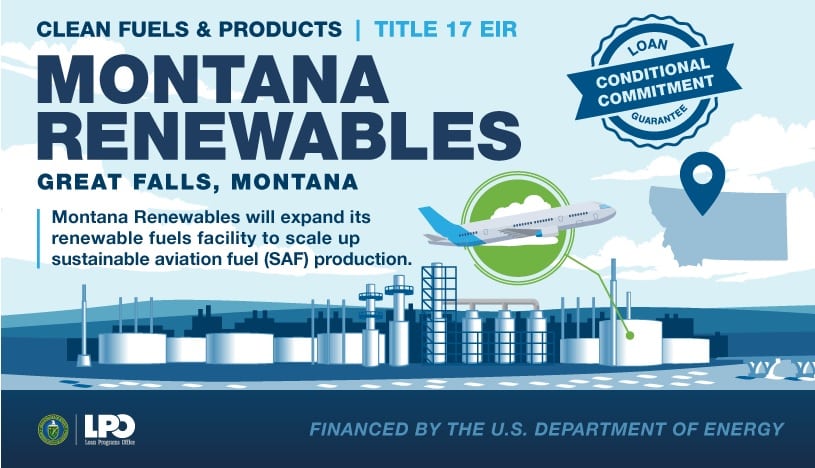U.S. Energy Department Offers Almost $3 Billion in Conditional Commitments to Two Sustainable Aviation Fuel Companies

The U.S. Energy Department on Oct. 16 announced conditional commitments for loan guarantees totaling almost $3 billion for two sustainable aviation fuel companies. Montana Renewables received a $1.44 billion conditional commitment from the department to expand its renewable fuels site in Great Falls. Gevo Net-Zero 1 received $1.46 billion in a conditional commitment from the department to finance its renewable jet fuel facility in Preston, South Dakota. This funding is possible through the Energy Infrastructure Reinvestment program of the 2022 Inflation Reduction Act.
Montana Renewables facility in Great Falls converts renewable feedstocks such as vegetable oils and fats to sustainable aviation fuel, or SAF, renewable diesel, and renewable naphtha. The Great Falls facility commenced operations in 2022 and has a current annual production capacity of 140 million gallons of biofuels, mostly renewable diesel. The funding, once finalized, would help expand this facility and increase the annual production capacity to 315 million gallons of biofuel.
For Gevo Net-Zero, the $1.46 billion loan guarantee would fund the construction of a large-scale corn starch-to-jet fuel facility in Lake Preston. The facility would utilize domestic, low-carbon field corn from local farmers as its renewable feedstock. Once complete, the site would be the first commercial facility to produce SAF from corn starch using renewable power and carbon capture technology. At full capacity, the South Dakota facility aims to produce more than 60 million gallons of SAF annually.
With the airline industry accounting for nearly 11 percent of emissions in the transportation sector and 3.3 percent of total emissions in the U.S., sustainable fuels have a key role to play in decarbonizing the aviation sector. As other technologies that could significantly decarbonize the aviation sector are still nascent, SAF is the only viable decarbonization solution for the aviation industry at the moment. SAFs could contribute 65 percent to the aviation industry’s 2050 net zero emission goals, according to the International Air Transport Association.
To decarbonize the airline industry quickly, the Biden administration has set the SAF Grand Challenge. The SAF Grand Challenge targets an increase in U.S. SAF production to 3 billion gallons every year by 2030, and 35 billion gallons per year by 2050. The challenge also aims to reduce lifecycle emissions by at least 50 percent, relative to aviation fuel from petroleum. Once the Great Falls factory reaches full capacity, it could produce around 300 million gallons of SAF per year, helping the industry to reach at least 10 percent of its SAF Grand Challenge production output.
EnerKnol Pulses like this one are powered by the EnerKnol Platform—the first comprehensive database for real-time energy policy tracking. Sign up for a free trial below for access to key regulatory data and deep industry insights across the energy spectrum.
ACCESS FREE TRIAL